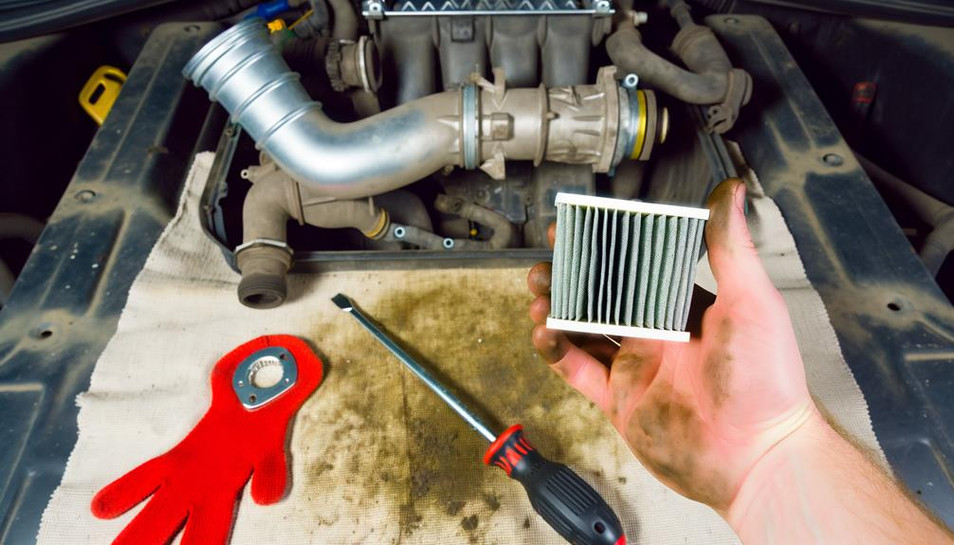Ensuring the proper maintenance of your vehicle’s intake system is crucial for optimizing engine performance, fuel efficiency, and overall reliability. Here’s a comprehensive guide to help you effectively maintain and care for your intake system:
1. Regular Air Filter Maintenance
Importance: The air filter is a critical component of the intake system, responsible for filtering out dirt, dust, and debris from the air entering the engine. A clean air filter ensures optimal airflow, which is essential for efficient combustion and engine performance.
Maintenance Tips:
- Inspection: Regularly inspect the air filter for dirt accumulation. A clogged air filter restricts airflow, reducing engine power and fuel efficiency.
- Replacement: Follow the manufacturer’s recommendations for air filter replacement intervals. Typically, this ranges from every 15,000 to 30,000 miles, but it may vary based on driving conditions.
- Cleaning: Some air filters are reusable and can be cleaned using compressed air or a vacuum. However, replace disposable filters with new ones when they are dirty.
2. Cleaning Intake Tubes and Hoses
Importance: Intake tubes and hoses deliver filtered air from the air filter to the engine. Over time, these components can accumulate dirt, oil residue, and debris, potentially obstructing airflow and affecting engine performance.
Maintenance Tips:
- Inspection: Regularly inspect intake tubes and hoses for cracks, leaks, or loose connections. Address any issues promptly to prevent air leaks that can disrupt the air-fuel mixture.
- Cleaning: Use a soft cloth or brush to gently clean intake tubes and hoses. Avoid using abrasive materials or harsh chemicals that could damage rubber or plastic components.
- Sealing: Ensure all connections are tight and properly sealed to prevent air leaks.
3. Maintaining the Mass Airflow Sensor (MAF)
Importance: The MAF sensor measures the amount of air entering the engine and sends this data to the engine control unit (ECU) to adjust fuel injection. A dirty or malfunctioning MAF sensor can lead to inaccurate airflow readings, affecting fuel efficiency and engine performance.
Maintenance Tips:
- Cleaning: Use a MAF sensor cleaner specifically designed for this purpose. Follow the manufacturer’s instructions carefully to avoid damaging the sensitive components of the sensor.
- Frequency: Clean the MAF sensor as part of your regular maintenance routine or whenever you notice symptoms of poor engine performance, such as rough idling or reduced fuel economy.
4. Inspection and Maintenance of the PCV Valve
Importance: The Positive Crankcase Ventilation (PCV) valve regulates the flow of gases from the crankcase to the intake manifold. A faulty PCV valve can lead to increased oil consumption, engine sludge buildup, and reduced performance.
Maintenance Tips:
- Inspection: Check the PCV valve periodically for proper operation. Replace it if it is clogged, stuck open, or otherwise malfunctioning.
- Replacement: Refer to your vehicle’s service manual for the recommended replacement interval. Typically, PCV valves should be replaced every 20,000 to 50,000 miles, depending on driving conditions.
5. Throttle Body Maintenance
Importance: The throttle body regulates the amount of air that enters the engine. Carbon deposits can accumulate on the throttle body over time, affecting airflow and throttle response.
Maintenance Tips:
- Cleaning: Use a throttle body cleaner and a soft cloth to remove carbon deposits and dirt from the throttle body. Be cautious and avoid damaging the sensitive throttle position sensor (TPS).
- Frequency: Clean the throttle body as part of your regular maintenance routine or whenever you experience symptoms of reduced throttle response or engine hesitation.
6. Inspection of Intake Manifold and Seals
Importance: The intake manifold distributes air evenly to the engine cylinders. Leaks in the intake manifold or its seals can disrupt the air-fuel mixture, leading to rough idling, engine misfires, and decreased performance.
Maintenance Tips:
- Visual Inspection: Regularly inspect the intake manifold and its seals for signs of leaks, such as dirt accumulation or oil residue around the seams.
- Sealing: Ensure all intake manifold connections are tight and properly sealed. Replace gaskets or seals as necessary to prevent air leaks.
7. Professional Maintenance Checks
Importance: While you can perform many intake system maintenance tasks yourself, it’s advisable to have a professional mechanic inspect your intake system during routine maintenance or if you notice any persistent issues.
Maintenance Tips:
- Diagnostic Checks: Professional mechanics have specialized tools and expertise to diagnose and address complex intake system issues, such as vacuum leaks or sensor malfunctions.
- Routine Servicing: Schedule regular maintenance appointments to ensure all intake system components are functioning correctly and efficiently.
Conclusion
Proper intake system maintenance is essential for maximizing engine performance, improving fuel efficiency, and extending the lifespan of your vehicle. By following these maintenance tips and incorporating intake system checks into your regular vehicle care routine, you can ensure clean airflow, optimal combustion, and a smoother driving experience. Remember, a well-maintained intake system not only enhances vehicle performance but also contributes to reduced emissions and overall engine health.




